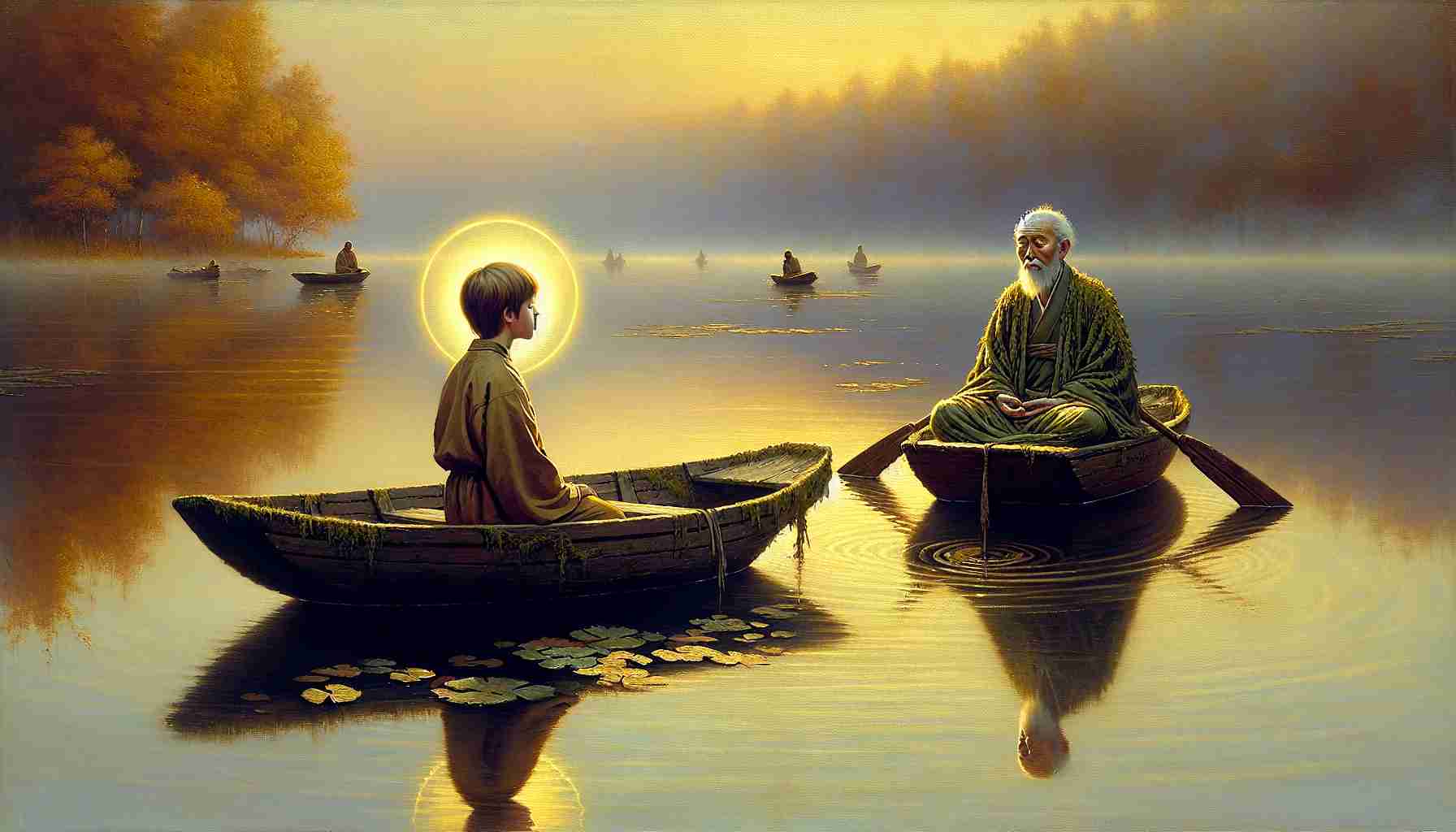

I had always believed that the harder I paddled, the faster I’d get across the river. I was thirteen, and my father often let me row our little fishing boat across Mirror Lake in the early mornings. He called it that because on quiet days, the water looked just like glass, showing you yourself more clearly than a polished mirror.
But I didn’t like stillness. It felt like nothing was happening. So even when the lake was calm, I rushed across it, forcing the oars through the water, always trying to beat my best time.
One morning, though, everything changed.
That day, Mist Elder came down to the lake. Mist Elder wasn’t his real name—we just called him that. He was a kind old man who wandered through the village once in a while, wrapped in soft robes that smelled of moss and tea. People said he had once studied under a Taoist named Liezi, who could ride the wind. I didn’t believe those stories, but I liked listening to them.
I was about to leap into the boat when Mist Elder raised a hand.
“Why so fast, young wave?” he asked, his eyes crinkling with a smile.
“I want to cross the lake quick,” I said. “So I can catch more fish.”
“Ah,” he nodded, stepping into his own small, wooden boat. “Watch me.”
He rowed out slowly, gently dipping his oars, almost like he wasn’t rowing at all. His boat drifted across the lake like a feather on the breeze. Mine slapped and splashed and rocked as I forced my way forward. I got to the other side first, but I was tired, panting, and wet. Mist Elder arrived minutes after, smooth and quiet, like the lake’s breath.
“How did you do that?” I asked.
“I didn’t do anything,” he said. “The lake carried me.”
I frowned. “But I rowed so hard.”
He dipped his hand into the water. “The wave that crashes fights the current. The wave that flows becomes the lake.”
I didn’t understand then, but I followed him the next morning. I rowed slower, watched the ripples, listened to the breeze. It was strange—doing less felt... better. I started to notice things. A turtle resting on a rock. A dragonfly landing softly on my knee. And something else, too.
Peace.
Over time, I stopped trying to go faster. Fishing became easier. I no longer scared the fish away. I caught more, with less. I even smiled more.
Years later, when people came to visit, I taught them how to sit still and let the boat drift. I told them about Mist Elder and how he once said, “Even an empty boat floats to the other side.”
I didn’t change overnight. But now, whenever I feel the urge to push too hard, I remember the stillness of the lake. I try to let things unfold naturally, and trust the way, like the ungrasped wave that never tries, yet always arrives.
I had always believed that the harder I paddled, the faster I’d get across the river. I was thirteen, and my father often let me row our little fishing boat across Mirror Lake in the early mornings. He called it that because on quiet days, the water looked just like glass, showing you yourself more clearly than a polished mirror.
But I didn’t like stillness. It felt like nothing was happening. So even when the lake was calm, I rushed across it, forcing the oars through the water, always trying to beat my best time.
One morning, though, everything changed.
That day, Mist Elder came down to the lake. Mist Elder wasn’t his real name—we just called him that. He was a kind old man who wandered through the village once in a while, wrapped in soft robes that smelled of moss and tea. People said he had once studied under a Taoist named Liezi, who could ride the wind. I didn’t believe those stories, but I liked listening to them.
I was about to leap into the boat when Mist Elder raised a hand.
“Why so fast, young wave?” he asked, his eyes crinkling with a smile.
“I want to cross the lake quick,” I said. “So I can catch more fish.”
“Ah,” he nodded, stepping into his own small, wooden boat. “Watch me.”
He rowed out slowly, gently dipping his oars, almost like he wasn’t rowing at all. His boat drifted across the lake like a feather on the breeze. Mine slapped and splashed and rocked as I forced my way forward. I got to the other side first, but I was tired, panting, and wet. Mist Elder arrived minutes after, smooth and quiet, like the lake’s breath.
“How did you do that?” I asked.
“I didn’t do anything,” he said. “The lake carried me.”
I frowned. “But I rowed so hard.”
He dipped his hand into the water. “The wave that crashes fights the current. The wave that flows becomes the lake.”
I didn’t understand then, but I followed him the next morning. I rowed slower, watched the ripples, listened to the breeze. It was strange—doing less felt... better. I started to notice things. A turtle resting on a rock. A dragonfly landing softly on my knee. And something else, too.
Peace.
Over time, I stopped trying to go faster. Fishing became easier. I no longer scared the fish away. I caught more, with less. I even smiled more.
Years later, when people came to visit, I taught them how to sit still and let the boat drift. I told them about Mist Elder and how he once said, “Even an empty boat floats to the other side.”
I didn’t change overnight. But now, whenever I feel the urge to push too hard, I remember the stillness of the lake. I try to let things unfold naturally, and trust the way, like the ungrasped wave that never tries, yet always arrives.